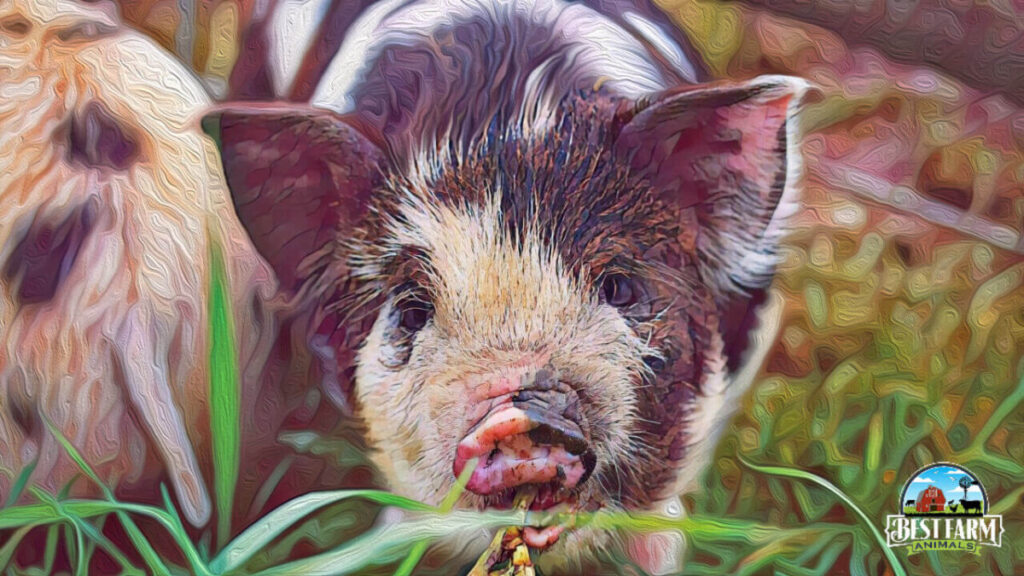Pigs have efficient digestive systems that convert animal and vegetable materials into digestible content. As a result, dairy products are a good source of nutrition, protein, and calcium for your standard meat pig. Even mini pigs and potbellies can benefit from having dairy products included in their diet in moderation.
Can pigs eat dairy? Pigs can eat and digest dairy products, including milk, cheese, and yogurt. Cheese and other dairy products are high in protein and contain valuable nutrients beneficial for growing pigs. You must only feed dairy products in moderation, especially if you have pet pigs prone to obesity.
Cheese may Improve a Pig’s Growth
Cheese is full of protein and, as such, can be beneficial for piglets and young hogs. Pigs need protein to grow and develop muscle tissue. Cheese is also typically high in sodium, harming your pig’s health. Excess sodium can cause salt poisoning in water-deprived pigs, so ensure your pig has plenty of fresh water available.
Not only does cheese contain lots of beneficial protein, but it’s also a great source of calcium, which pigs need to develop strong bones and teeth. It also contains riboflavin, phosphorus, zinc, and vitamins A and B12. These nutrients are essential for a pig’s health and are not always available in grain feeds.
Pigs can digest all types of cheese, from soft cheeses like brie, feta, cream cheese, and cottage cheese to hard cheeses like cheddar and gruyere. Even blue cheese is safe for pigs because, although it contains mold, it doesn’t produce any potentially harmful mycotoxins.
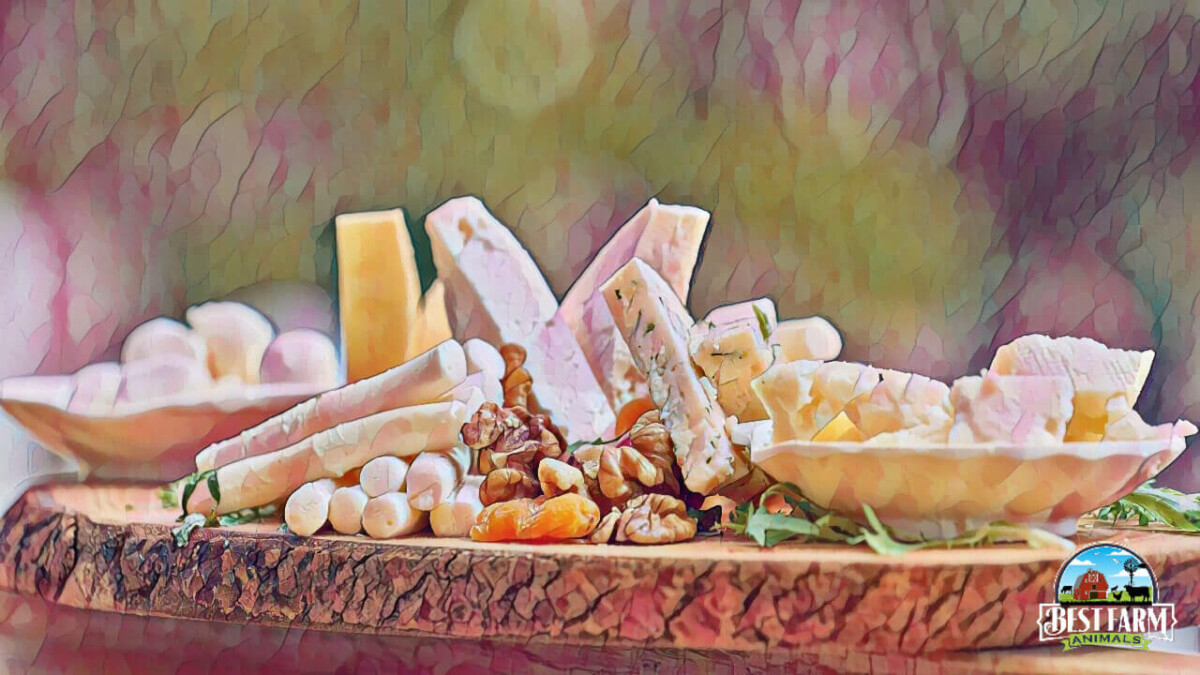
Cheese is Safe for Minipigs
Most minipigs will happily eat as much cheese as you care to feed them, but too much can cause constipation and indigestion. It’s best to provide a minipig small quantities of cheese, using it as a treat or reward, rather than a component of their daily nutrition.
The best type of cheese to feed a minipig is one that contains only natural ingredients. Artificial flavorings and preservatives may cause indigestion and have few nutritional benefits for your mini pig.
Similarly, grass-fed cheese provides a healthier balance of omega-3 and other nutrients than regular cheeses.
Some types of cheese also contain probiotics that can benefit a minipig’s gut health. Cheeses with the most healthy bacteria include “aged, traditional cheddars, Gouda, and Alpine cheeses like Gruyère.”
Cheese Byproducts can Reduce Diarrhea
Cheese byproducts, particularly whey, contain so many health-promoting bacteria that some commercial pig farmers are using them to prevent diarrhea.
Sarmauli Manurung of the Danish National Veterinary Institute at the Technical University of Denmark has conducted several studies indicating “that fermented whey permeate can help prevent the pigs from getting diarrhea from E. coli infections.”
Not only does whey reduce diarrhea, but it also helps young piglets gain weight more effectively. It also helps improve the health of piglets by reducing their reliance on chemical antibiotics.

Mac and Cheese Isn’t a Healthy Food for Potbellied Pigs
If you’ve ever wondered if your pig would enjoy a serving of Mac and cheese, you need look no further than this video. Tilly, the potbellied pig, tucks into this Mac and cheese with evident enthusiasm, but that doesn’t necessarily mean it’s a nutritious meal.
A standard serving of Mac and cheese contains pasta coated in a cheese sauce. All types of pasta have high levels of carbohydrates and salt, neither of which are particularly good for your pig.
Studies show that minipigs on a diet that’s high in carbohydrates are more inclined to become aggressive and develop skin lesions. They also tend to be more fearful of novel objects and engage in more combative social behavior.
Read this article for more information about handling an aggressive pig safely.
Too many carbohydrates can also lead to unhealthy weight gain. Research indicates that obesity is the “most common nutritional disease in potbellied pigs” and mini pigs, so owners should try to avoid unhealthy weight gain. Complications associated with obesity in pigs include “coronary artery disease, premature arthritis, joint disease, and diabetes.”
Feeding pasta-based meals, such as Mac and cheese, to meat pigs isn’t as problematic as for mini pigs and potbellies. One study found that feeding dry pasta to heavy pigs in Italy positively impacted “growth performance, carcass characteristics, and ham quality.”
Milk can Reduce Feed Costs in Commercial Meat Pigs
Owners experimenting with milk in their pigs’ diets have found that they can reduce feed costs by up to 75%. If you have access to enough milk, it may even be possible to eliminate all supplementary grain feeds from your pigs’ diet, assuming you have a well-maintained pasture-based rotational grazing system.
Pigs will happily drink fresh milk but get more nutritional benefits from aged milk as they find curdled milk easier to digest.
Skim milk is particularly beneficial for pigs as it contains high-quality protein and easily digestible carbohydrates.
Unfortunately, not all states allow you to feed animal-derived waste products to pigs. For example, you can only provide pasteurized milk to farm animals in California, as unpasteurized milk is seen as “animal waste.”
Even if it’s legal to feed milk to your pigs, it may not be entirely beneficial. Milk contains a lot of fat, so it can cause your pig to gain weight too quickly. Cow’s milk may also cause diarrhea in piglets, possibly because it’s too rich for their digestive systems.
On the other hand, milk contains essential components that can benefit a piglet’s development by providing “nutritional and immunological protection.”
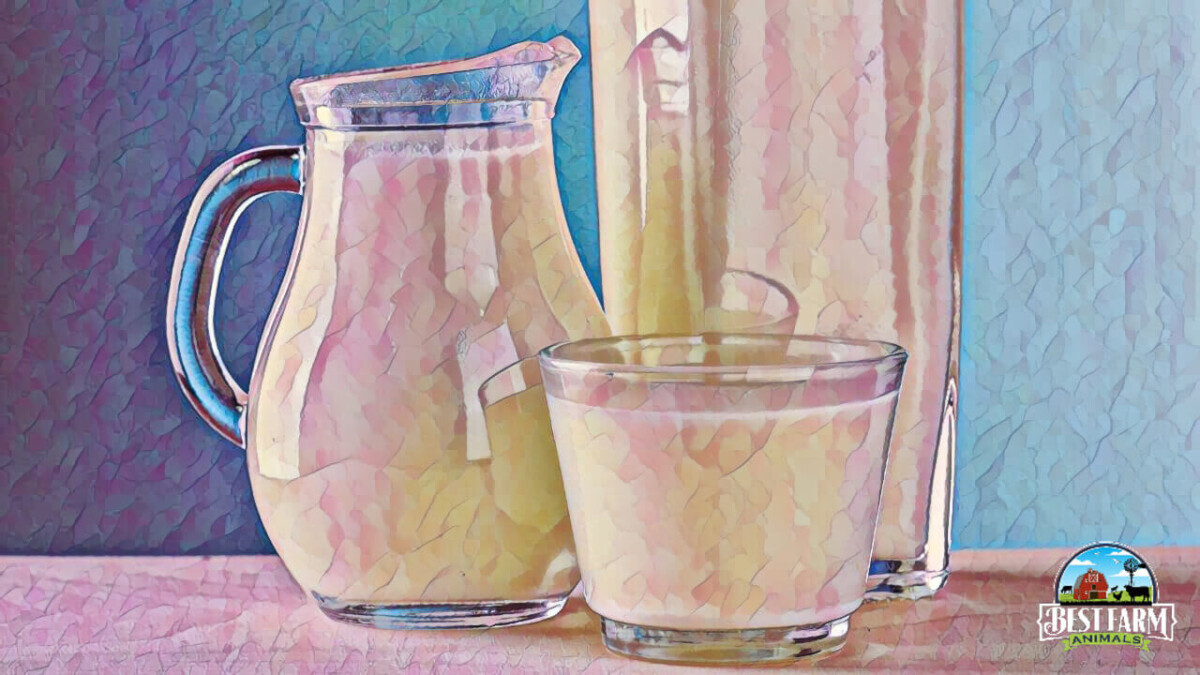
A Pure Milk Diet could be Dangerous for Minipigs
While the milk is safe for mini pigs to consume, it may contain traces of urea which is less beneficial to your pig’s health. Many dairy farmers give their cows formula dairy feeds that contain urea. The cow’s digestive system can convert this into protein, but the pig’s can’t. If a minipig eats only dairy products, it could result in protein deficiency and poor growth rates. Urea is “also a highly toxic chemical when consumed in excess.”
Over the years, I’ve fed milk to my sows and piglets reasonably regularly and with no adverse effects. Admittedly, we never fed milk more than a couple of times a week, and only as a small portion of their complete feed. This diet promoted weight gain and stimulated growth. The pigs also loved it!
Despite that, some sources say that minke isn’t “advisable to feed to pigs,” although they fail to explain why. I believe milk is suitable for pigs to eat but only in moderation and as part of a balanced diet.
Buttermilk is a Traditional Supplement for Hogs
In addition to giving our pigs milk, we also gave them the buttermilk we had left over from our butter-making efforts. The pigs loved this more than fresh milk and seemed to gain weight faster. Again, it never made up a large portion of their diet but was used in a more supplementary capacity.
While researching this article, I discovered a piece published in the Berkshire World and Cornbelt Stockman in June 1917. According to the author, “skimmed milk or buttermilk are among the best supplements for corn in fattening hogs.” He recommends feeding young pigs “ten gallons of milk to one bushel of corn” and reducing this as they mature.
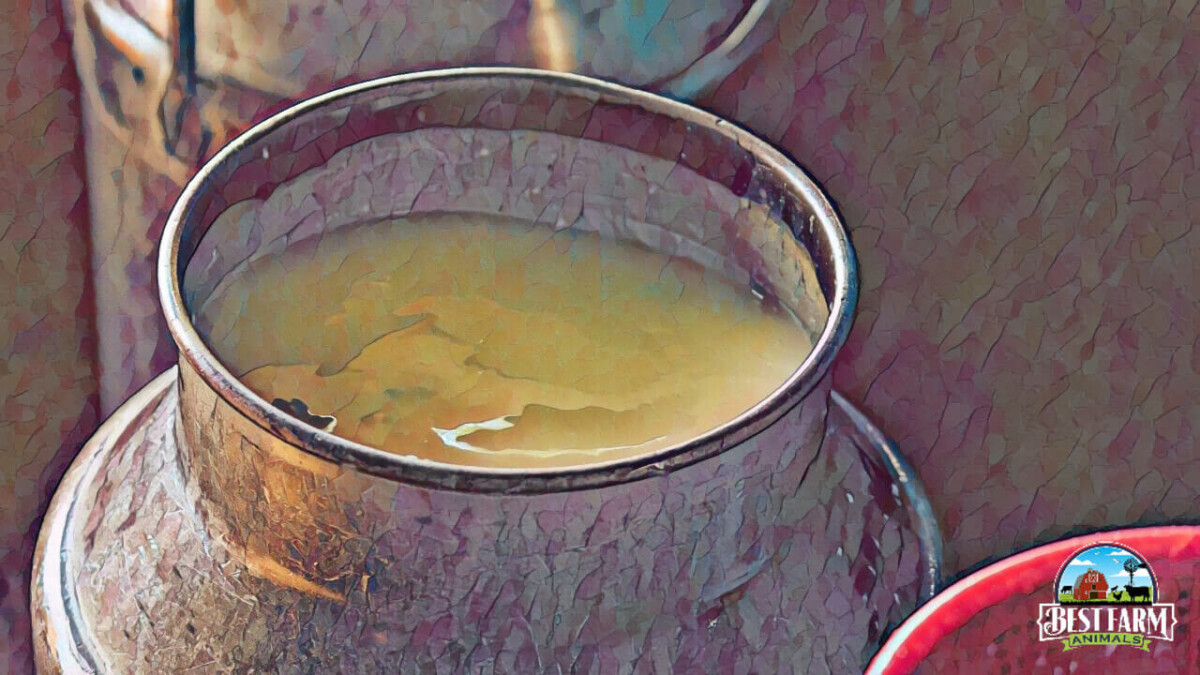
Natural Yogurt may Improve a Pig’s Digestive System
Yogurt contains many of the nutrients pigs need to stay healthy. Like other dairy products, it’s rich in protein and contains calcium, phosphorus, potassium, magnesium, and the vitamins D and B12.
Yogurts containing live bacteria are even better for your pig, benefitting their digestive health and strengthening their immune systems.
A research project conducted at the Iowa State and Ohio State universities indicates that feeding yogurt to young pigs can reduce their salmonella levels, making them safer for human consumption.
Danish pig producers swear by including yogurt in their pigs’ diets, claiming it helps “support a healthy growth” and minimizes the need for antibiotics. There, “yogurt products are widely used for piglets suffering from digestive disturbances” and to supplement large-liter diets.
Some Yoghurts May be Harmful to Potbellies and Minipigs
Not all yogurts are healthy for pigs. Some contain large quantities of sugar or artificial ingredients that may harm your pig’s health.
Some dairy-free yogurts have almost no health benefits for pigs, containing large amounts of sugar and barely any protein.
The best yogurt to feed your mini pig or potbelly contains only natural ingredients and no added sugar. If you want to give your pig a healthy treat, you could even try making your own yogurt.
Kefir may Benefit Post-Weaned Pigs
Kefir is a fermented milk product similar to yogurt. It’s a powerful prebiotic and a good source of calcium, protein, and potassium.
Kefir can positively affect the health of post-weaned pigs when fed as a functional feed additive. Not only does it enhance their “innate immunity,” but it also increases their average daily weight gain.
Researchers concluded that kefir could be utilized as “an antibiotic alternative to improve both the innate immune system and growth performance of post-weaned pigs.
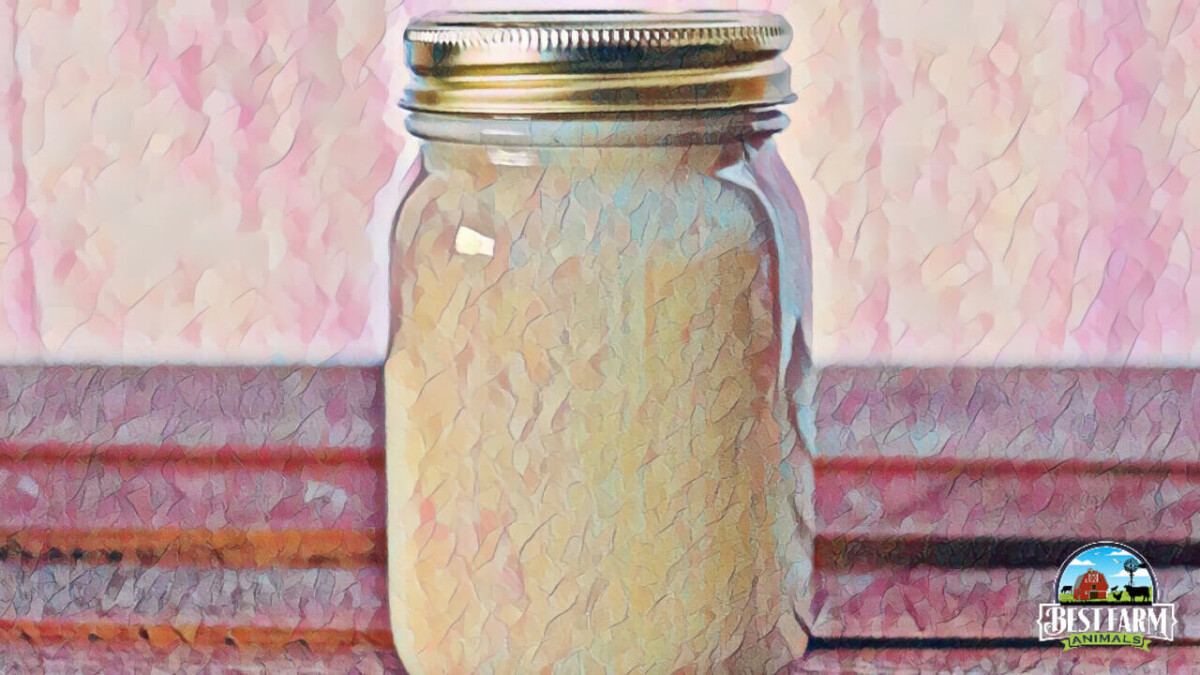
The Pros and Cons of Feeding Pigs Dairy Products
Milk, cheese, buttermilk, and kefir have health benefits for pigs when fed in moderation. Providing in excess can have a negative impact, causing protein deficiency and obesity.
Other dairy products you might consider feeding your pig include sour cream, butter, ice cream, and mayonnaise.
Sour Cream is Unsuitable for Pigs
Sour cream has some nutritional benefits due to its calcium content, but it’s high in sodium, making it unsuitable for pigs.
Butter is a Good Energy Boost for Pigs
If you want to give your pigs a winter energy boost, butter is an excellent, if somewhat expensive, option. Conversely, butter’s high-fat content could upset your pig’s digestive system, causing diarrhea. There is even a chance of your pig developing a prolapsed rectum, a potentially fatal condition.
Pigs Love Ice Cream
While you may not consider ice cream to be healthy food, it’s surprisingly good for pigs. In the Eighties, Ben & Jerry handed over all their excess ice cream, and “milky rinse water” to 250 piglets, who appeared to thrive on a diet of Cherry Garcia and Heath Bar Crunch flavored ice cream.
There are numerous videos of owners treating their mini pigs to ice cream on a hot summer’s day. As far as they’re concerned, “it is completely safe to give pigs ice cream, and it will not disrupt their diet or digestive system.” I’m not so sure, however. Ice cream contains a lot of sugar and fat, so although it has some nutritional benefits, it’s not ideal as a diet for pigs.
Mayonnaise is Good for Fattening Pigs
Mayonnaise isn’t something you necessarily think of feeding to pigs, but researchers have found it to be a cost-effective addition to the growing pig’s diet. Its high-fat content is not as beneficial to mini pigs and potbellies.
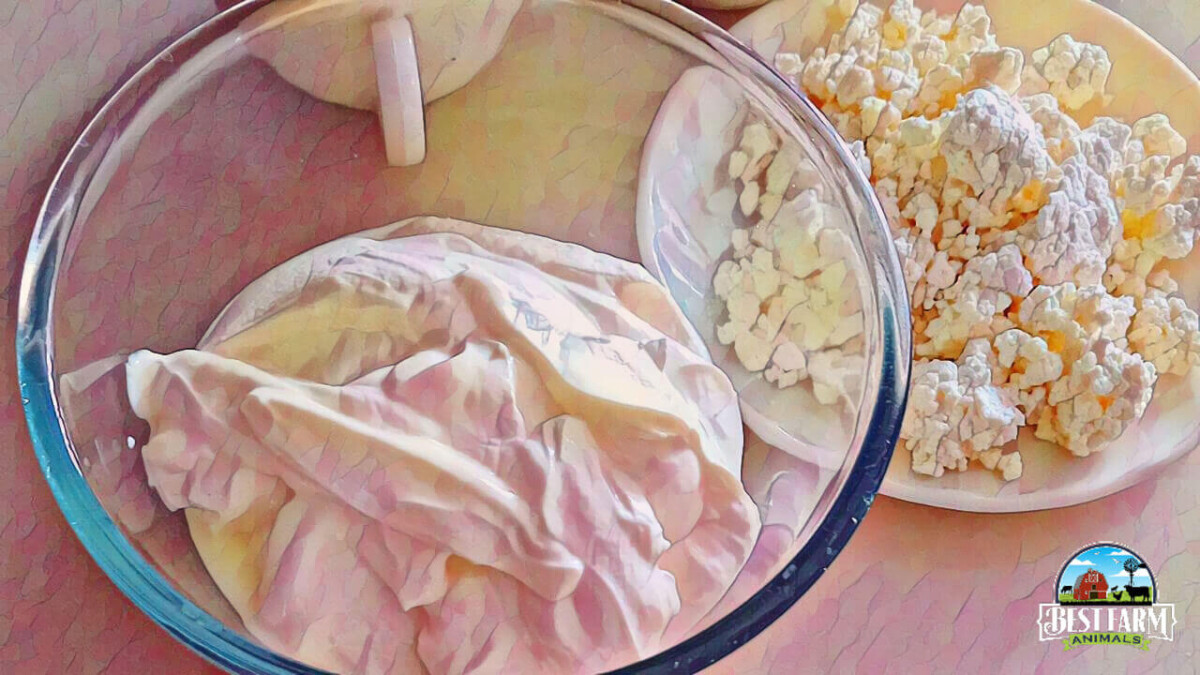
Conclusion
While it’s perfectly safe for pigs to eat dairy products, they often contain too much fat and salt to make them genuinely beneficial to the pig’s health. If you’re struggling with an underweight pig, adding milk or cheese to their diet will help them gain weight more quickly. For the average pet pig, however, the increased fat content is liable to cause obesity.
You can include dairy products in a balanced diet, but only in moderation. Cheese is best used as a training treat for pet pigs rather than a part of the daily diet, while skim milk is more beneficial to young, growing pigs than to mature adults.
My Most Used Pig Supplies
This list contains affiliate products. Affiliate products do not cost more but helps to support BestFarmAnimals and our goal to provide farm animal owners with accurate and helpful information.
Purina Pig Chow will last well (or Mazuri is popular, but I haven’t tried it), and the stainless steel non-skid bowls that will help keep the mess down.
A pig blanket to keep her warm. This one also has bright colors and helps to provide rooting without the destruction.
Pig Harness for walking and handling your pig. There are a lot to choose from, but this one is pretty easy to use. If you want one that has a separate leash, this looks like a good one.
A large crate for keeping her safe in your house at night and when you leave the house. This is essential. You’ll also want a litterbox, and I like mine with a lid for nighttime. Pine shavings are best, and you may be able to find them in larger quantities locally.
When you have accidents, Odoban will help eliminate odors. When you are potty training, these floor pads work great for keeping your house clean while training her to go in certain places.
You’ll also want an outdoor house to keep her warm when she gets outside time, an essential part of her development.
Dewormer- Ivermectin is the primary dewormer I use, although I do rotate with a non-ivermect ingredient once so that the worms don’t get immune to it.

